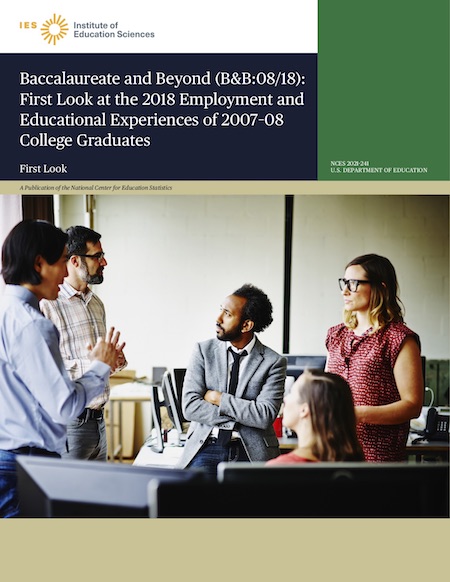 A new report from the U.S. Department of Education offers data on the well-being of people who graduated from college in the 2007-08 academic year, 10 years after they completed their bachelor’s degrees.
A new report from the U.S. Department of Education offers data on the well-being of people who graduated from college in the 2007-08 academic year, 10 years after they completed their bachelor’s degrees.
Here are some of the highlights of the report with regards to differences between Blacks and Whites.
- Some 66.8 percent of Whites who graduated from college in the 2007-08 academic year owned their home 10 years later in 2018. For Blacks, the figure was 46.9 percent.
- More than 37 percent of Blacks reported a negative net worth 10 years after earning their bachelor’s degrees. For Whites, 17.8 percent had a negative net worth.
- Almost 30 percent of Blacks reported that they “did not meet essential expenses in the past 12 months.” For Whites, the figure was 11.2 percent.
- Thirty percent of Blacks who earned a bachelor’s degree in the 2007-08 academic year had earned a master’s degree 10 years later. Only 26.6 percent of Whites had earned a master’s degree. Whites were significantly more likely than Blacks to earn a professional degree within 10 years of graduating from college. Some 1.7 percent of both Black and White bachelor’s degree recipients in the 2007-08 academic year had earned a doctorate by 2018.
- During the 10 years after earning their bachelor’s degrees, Whites were unemployed for an average of 5.5 months. For Blacks, the figure was 9.4 months.
- Ten years after earning their bachelor’s degree, White full-time workers had an average income of $82,170 compared to an average income of Blacks of $65,104.
- Only 38.5 percent of Black college graduates in the 2007-08 academic year held supervisory positions at work compared to 50 percent of Whites.











This study is woefully lacking because it fails to specifically point out the role of systemic, institutional, implicit and explicit racism factors in regarding native born Black Americans. Political correctness will not solve these ongoing racial problems.
Systemic racism is truly an issue. It is undergirded by several factors that too few leaders want to address. First, many of the hiring agencies and decision makers are white and are unwilling to break from their good old white perch and perks.Moreover, they have not interest in risking their status to implement hiring related to African Americans. Secondly, local hiring agencies made up of people from the Indian, Asian, and Latin communities make little efforts to hire African Americans. In fact the only group held accountable—sometimes are whites. Look around, the other groups hire their own mostly. Thirdly, lending institutions discriminate against African Americans even with money thus limiting their borrowing power which in turn affect their ability to buy homes or start a business. Thirdly, because we own so few businesses we are limited in our ability to hire African Americans or any one else. Fourthly, African American decision making is a factor particularly as it relates to money. We seem to dote more on how much we make than how much we keep, save, or invest. Financial awareness is a short coming in the African American community and must be addressed earlier. Too much Conspicious Consumption is an issue.
Finally this research should be an ongoing topic of discussion along with further examination of graduating classes across our diaspora. Thanks